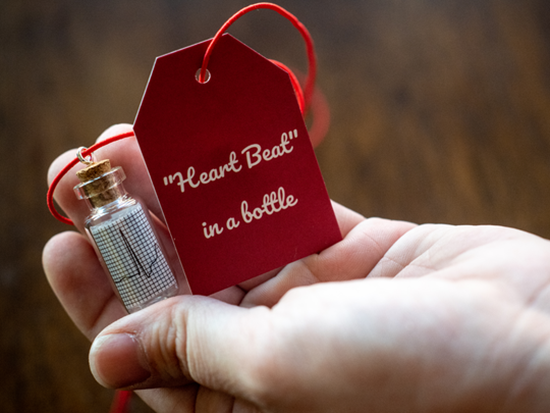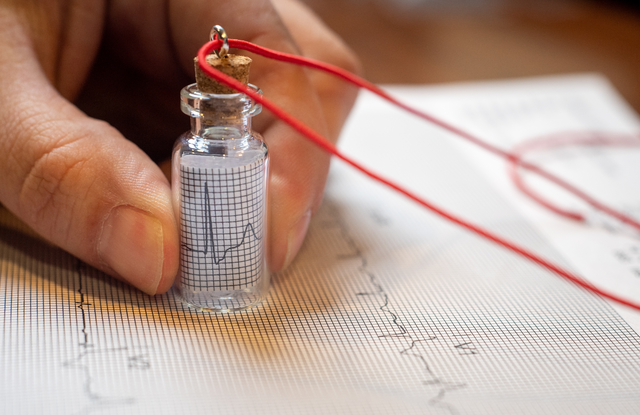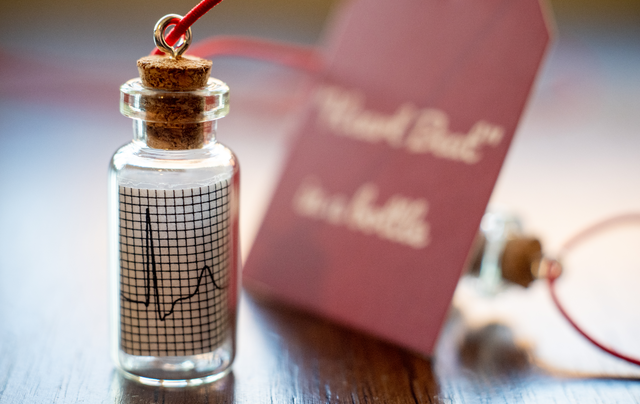Media contact: Anna Jones
 To help families cherish the loving memory of their dear ones, a UAB nurse started her “Heartbeat in a Bottle” initiative to give families a unique way to remember the loved ones they have lost.
To help families cherish the loving memory of their dear ones, a UAB nurse started her “Heartbeat in a Bottle” initiative to give families a unique way to remember the loved ones they have lost.
Photography: Steve WoodThe loss of a loved one can be hard. It may be one of the most difficult experiences in a person’s life. Felicia Vaughn, a registered nurse at the University of Alabama at Birmingham Center for Palliative and Supportive Care, is supporting grieving families in a special way — with a heartbeat in a bottle.
Vaughn takes a printout of a patient’s EKG, a recording of the heart’s electrical signal, and places it in a medicine vial to create a simple, yet meaningful gift for the families she serves. Vaughn started creating these keepsakes in September of 2021. She has now done almost 700.
The beginning
During weekdays at the center, the staff’s music therapists record patient’s heartbeats via a Bluetooth stethoscope for their “Heartbeat Project,” which incorporates it into a song.
“I wanted to find a way to expand upon that effort to support our patients and their families,” Vaughn said. “My heart would break seeing families grieve the loss of their loved ones, and I kept trying to think of ideas for how I can help support these families during their stay with us.”
In 2021, Vaughn had a patient who had two children the same age as hers. Her connection with that patient and her family led to an epiphany. She made her first heartbeat in a bottle — an idea Vaughn saw on Pinterest.
She took a medicine vial, cleaned it, and put the patient’s last EKG in it with their name, time of passing and a red ribbon. She presented the gift to the patient’s family; but at the time, she was not sure how the family would receive it.
 Vaughn takes a printout of a patient’s EKG, a recording of the heart’s electrical signal, and places it in a medicine vial.
Vaughn takes a printout of a patient’s EKG, a recording of the heart’s electrical signal, and places it in a medicine vial.
Photography: Steve Wood“The family members were in awe and told me that this meant everything to them. They requested that I keep doing this with other patient families,” Vaughn said. “That was the starting point of turning it into a process and doing this on a regular basis for the families of our patients.”
Through this initiative, Vaughn hopes that she can ease the grieving process and offer support to these families in any way she can. Her “Heartbeat in a Bottle” journey is filled with many special stories that have kept her going.
“It is so special to me to see and hear how much these bottles have meant to the families of my patients,” she said. “It almost makes me cry thinking that I could make something they could cherish forever. It is something so small but holds a big meaning for many of our patients’ families.”
Overwhelming response
Although the design of the bottles has changed over time, the mission has stayed the same. Today, Vaughn’s colleagues in the unit have joined her in creating these bottles, with family support and permission.
“It’s so hard losing someone,” Vaughn said. “The families love when I give them these bottles as something to hold onto as they walk out of the hospital door. Some wear them as bracelets and some as necklaces. It warms my heart to see them cherish the memories of their loved ones through this small gift.”
 Since they began creating these keepsakes in September of 2021, Vaughn and her colleagues have done almost 700.
Since they began creating these keepsakes in September of 2021, Vaughn and her colleagues have done almost 700.
Photography: Steve WoodAccording to Vaughn, the feedback has been very positive.
Katelyn Bush, whose mother passed away last November, received a heartbeat in a bottle when her mother was in the palliative care unit.
Bush originally wanted a copy of her mother’s EKG for a tattoo, but says she was unsure how to ask for it. When she learned about the “Heartbeat in a Bottle” program, she was floored and thankful for the gift.
“My mother was my closest friend and confidante,” Bush said. “To have a piece of her after she passed means more than I can express. Losing someone is never easy, but the nurses in the Palliative Care Unit made it much more bearable. They supported us as we grieved and showed my mother compassion and genuine care. I am so grateful to the people who cared for my mom. Everyone we came into contact with was so kind and provided outstanding care.”
Palliative care is a medical specialty focusing on relief of the pain, stress and other debilitating symptoms of serious or terminal illnesses. The UAB Center for Palliative and Supportive Care takes a holistic approach to care for these critically ill patients with an interdisciplinary team that includes physicians, nurses, physical therapists, psychologists, counselors, massage therapists, music therapists, social workers and others committed to supporting patients and their families through the stress of serious illness. To learn more about UAB’s Center for Palliative and Supportive Care, visit uabmedicine.org/palliativecare.